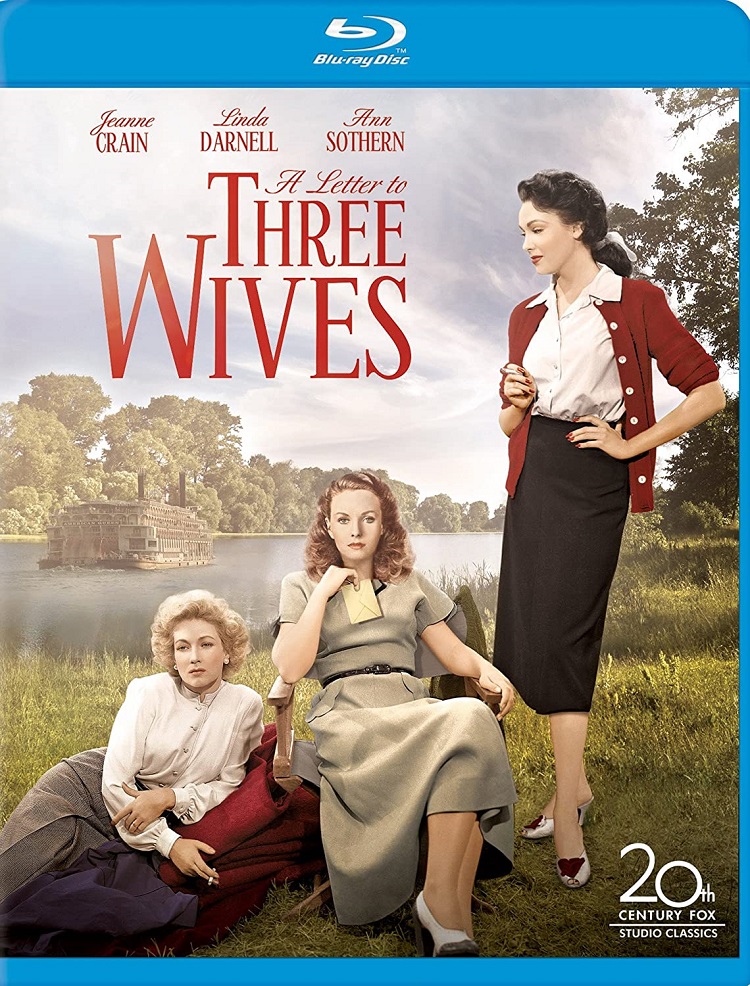
The Film
A mildly clever conceit, a very capable cast and the sure-handed direction of Joseph L. Mankiewicz make A Letter to Three Wives a genial experience, even if the script, an adaptation of John Klempner’s Cosmopolitan Magazine novel, is neither all that trenchant in its depiction of marital strife or urgent in its narrative of possible domestic betrayal. The film doesn’t set out to be a trifle, but it kind of feels like one; only a handful of scenes in this crisscrossing flashback marathon possess that much staying power.
Starring Jeanne Crain, Ann Sothern and Linda Darnell as good friends and the titular three wives, the film opens with the haughtily detached narration of Addie Ross (an uncredited and unseen Celeste Holm), introducing us to the women and their husbands. Red flags of unreliability pop up immediately (it’s kind of too bad Mankiewicz mostly drops Holm’s undercutting voiceover after the opening), and for good reason. The three women receive a letter from Addie claiming she’s run off with one of their husbands that very day, and a series of flashbacks make it clear it could have been any of them.
Deborah (Crain), a former farm girl, was uneasily integrated into the upper class social circle of her husband, Brad (Jeffrey Lynn), and has never felt all that comfortable there. It doesn’t help matters that Addie and Brad used to be considered practically an inevitable item by every one in town.
Rita (Sothern) is a sassy career woman on the upswing in the radio soap opera business, and she seems to have a stable relationship with her teacher husband George (Kirk Douglas). A social call from her bosses brings some tensions to the surface though, igniting George’s insecurity about his and Rita’s disparate income levels and causing her to forget a birthday that Addie conveniently remembered.
Lora Mae’s (Darnell) flashback goes back a little further, to the genesis of her relationship with wealthy older businessman Porter (Paul Douglas), a marriage that might be built on nothing more than her gold digging and his misguided notions of romance.
Of these sequences, Sothern and Douglas’s is the strongest, culminating in a memorable Douglas monologue where he rails against the virtues of corporatism and soulless radio advertising. Sothern and Douglas’s complementary firebrand natures make the sequence more dynamic than the others, although the overlong Darnell/Douglas flashback is eventually rather moving.
The “who cheated” mystery is a reasonably sturdy framework for this partly comedic, partly dramatic examination of marriages that may be on the rocks or may just be experiencing normal levels of interpersonal conflict. The disparate parts here are pretty good, but that main narrative engine ends up feeling like more of a screenwriting gimmick in the end than anything.
The Blu-ray Disc
A Letter to Three Wives is presented in 1080p high definition and the original 1.33:1 aspect ratio. Fox offers up a steady, attractive black-and-white transfer here, with nice levels of clarity and no major damage to be seen anywhere. The blacks perhaps aren’t as deep as one might hope and some of the shots reveal an inherent softness in the materials (particularly noticeable in filtered shots of Linda Darnell), but overall, the transfer has a very film-like look. The uncompressed mono soundtrack is just fine, offering clear dialogue and reasonably crisp reproduction of the minimal score and the diegetic music.
Special Features
The extras from the old DVD release are ported over, including a commentary track featuring scholars Kenneth Geist and Cheryl Lower and the director’s son, Christopher Mankiewicz, a Biography doc on the tragic life of Linda Darnell, a brief newsreel excerpt from that year’s Oscars and the film’s theatrical trailer.
The Bottom Line
Fox has certainly been the most laudable major studio lately in its Blu-ray treatment of classic titles, and though A Letter to Three Wives isn’t a masterpiece, it’s nice to see it get such a solid high-def upgrade.